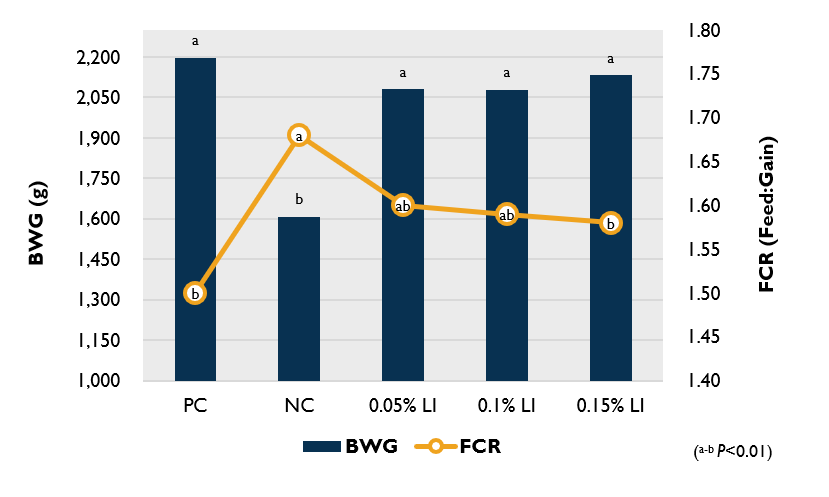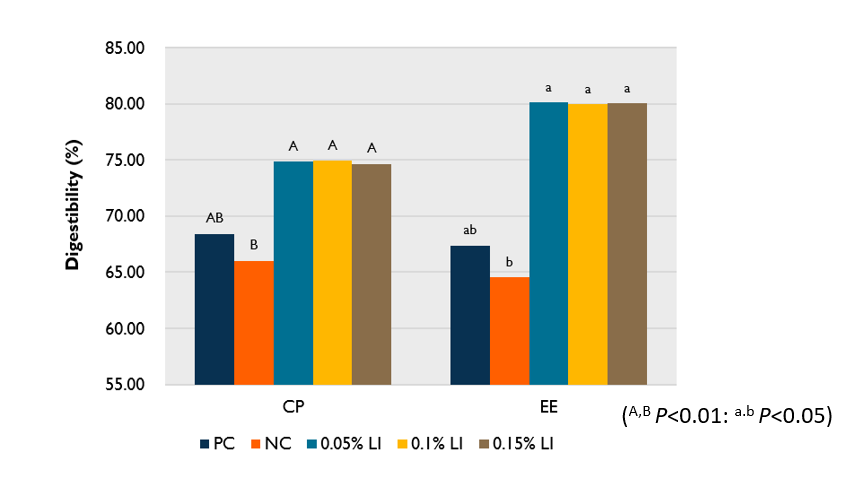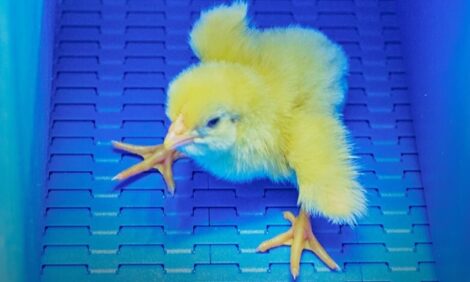



The growth benefits of using Lipidol® in broilers
Lipidol®: a powerful combination of four functional lysophospholipids and a key to nutrient absorptionYou are familiar with the functionality and benefits of lysophospholipids. However, have you considered the content of the active components you are using? Animal feeding is becoming more precise. With increased knowledge of how nutrients are digested and metabolized, we can more accurately predict animal performance and use our resources more efficiently. The use of feed additives is necessary for precision nutrition.
Dietary consolidation with lysophospholipids
Lysophospholipids provide modern broiler diets with a unique new functionality by improving the efficiency of the small intestine's natural function and enabling the use of key cereals such as soya less frequently. They are produced by hydrolyzing the naturally occurring phospholipids in soya lecithin. Lysophospholipids are glycerophospholipids in which just one hydroxyl group of the glycerol backbone is acylated and one acyl chain is lacking (Cho et al., 2013). They have a unique function within the small intestine where they will increase the efficiency of protein channels used for nutrient absorption. Subsequently, lysophospholipids could also easily diffuse quickly into the lipid part of membranes. By this mechanism, they could be able to modify the fluidity and permeability of the membrane (Shier et al., 1976). According to reports, lysophospholipids change the fluidity of biological membranes and increase macromolecule permeability through membranes (Tagesson et al., 1985). Utilizing lysophospholipids as feed additives is advantageous since it increases the rate of nutrient utilization. By increasing the absorption of nutrients, all nutrients in the diet will quickly pass through the small intestinal barrier and into the bloodstream for use.
Pathway Intermediates proudly presents Lipidol, the first nutrient absorption accelerator with proven benefits in reducing feed costs, while optimizing feed efficiency and performance.
Lipidol®: a powerful combination of four functional lysophospholipids and a key to nutrient absorption
Lipidol is composed of four different functional lysophospholipids including lysophosphatidylcholine (LPC), lysophosphatidylinositol (LPI), lysophosphatidylethanolamine (LPE), and lysophosphatidic acid (LPA).
Multiple factors, such as the structure of the cell membrane of the epithelial cells, affect nutrient absorption in the small intestine. Lipidol is a unique nutrient absorption accelerator, based on different functional lysophospholipids. The cell membranes of the intestinal wall are modulated by Lipidol, making them more permeable and able to absorb more nutrients. As a result, the animal has access to more energy and amino acids, which helps the nutritionist to reformulate energy and protein in the feed formulation, thus reducing feed costs.
Benefits of utilizing Lipidol®
Lipidol mostly consists of lysophospholipids which feature the nutrient absorption promotion function which does not possess by traditional emulsifiers. Lipidol has been thoroughly investigated and its impact on nutrient absorption in various ways has been demonstrated scientifically due to its essential roles in cellular membranes. It accelerates cellular nutrient absorption such as energy, protein, and amino acid which improves livestock performance. The effect of Lipidol on promoting the absorption of glucose and amino acids is clearly proven not only on glucose uptake in-vitro test but also in various academic articles. These nutrient uptake enhancement effects of Lipidol can improve animal growth performance. In addition, while common emulsifiers increase only fat digestibility, Lipidol can also increase protein digestibility through several in-vivo trials.
Effects of Lipidol® on growth performance and nutrients digestibility of broilers
A previous study at Seoul National University, South Korea investigated the effect of Lipidol supplementation on growth performance and nutrient digestibility in broilers. The investigation was carried out with 300 day-old chicks (Ross 308). Treatments used include PC (corn-SBM based diet), NC (PC – 150 kcal ME/kg diet – 5% protein and amino acid), 0.05% LI (NC + 0.05% Lipidol), 0.1% LI (NC + 0.1% Lipidol), and 0.15% LI (NC + 0.15% Lipidol).
Reduction of metabolizable energy along with CP and amino acids in the broiler diet had negative effects on body weight gain and feed conversion ratio. However, supplementation of Lipidol in NC diet significantly increased body weight gain (P<0.01). Also, the feed conversion ratio was significantly reduced by Lipidol supplementation compared to the NC treatment.

Supplementation of Lipidol in a reformulated diet of broiler significantly increased the digestibility of crude protein (P<0.01) and ether extract (P<0.05) compared to NC treatment (Figure 2).

Consequently, these results indicate that Lipidol supplementation had positive effects on growth performance and nutrients digestibility of broilers, and it could be assumed that dietary inclusion of Lipidol could compensate for the negative effect of energy reduction along with crude protein and amino acids in the diet of broilers.
For more information, please contact your Pathway Intermediates representative.








